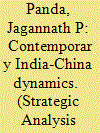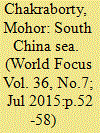| Srl | Item |
| 1 |
ID:
133612


|
|
|
|
|
| Publication |
2014.
|
| Summary/Abstract |
This review essay examines the significance of India-China relations against the background of the current phenomenon of a multipolar world in the light of four recent publications on the subject. Tien-sze Fang's and Jeff M. Smith's works discuss the current facets of India-China relations, while William Antholis's and Carl J. Dahlman's works deal with the character and standing that India and China bring to their regional and global discourse. After reviewing the core of these books, this essay will seek to locate the dialogue and import of India-China relations in two constructive settings: first, the versatility of this relationship in a multipolar world order; second, why this relationship is important to the future of multipolar world politics. In the official idiom, India-China dynamics are not confined to the bilateral ambience. For example, a joint statement issued on the occasion of the visit of Premier Li Keqiang to India (May 20, 2013) records that 'There is enough space in the world for the development of India and China … As the two largest developing countries in the world, the relationship between India and China transcends bilateral scope and has acquired regional, global and strategic significance'.1 This official endorsement comes against the background that the year 2014 is the 60th anniversary of the occasion when the Panchasheel discourse was first enunciated.
|
|
|
|
|
|
|
|
|
|
|
|
|
|
|
|
| 2 |
ID:
148259


|
|
|
|
|
| Summary/Abstract |
In 2000 the city of Johannesburg adopted the vision of becoming a World Class African City (WCAC). Since then Johannesburg has been energetically promoted in accordance with this vision. The tagline ‘world-class African city’ is now used in the branding of the city. It has become a major signifier on its logo and a notable catchphrase in its radio adverts of its brand. However, the nested opposition of the ‘world-class’ and ‘African’ discourse has not been explicitly defined in the vision beyond their simplistic connection. Many people have found the vision puzzling and some have questioned its claims. This paper explores the conundrum that lies in the nested opposition of the ‘world-class’ and ‘African’ discursive currents. It identifies the ‘global’ and ‘local’ discursive forces (in the country) which were formative in the creation of the vision. It looks at how the intersection of global and African discursive fronts has become leverage for generating hybrid cultural/cosmopolitan identities. The thrust of the paper is that the urban practices and landscapes of post-apartheid Johannesburg are enacted and re-enacted together with the inspiration, signification and/or representation of the city vision.
|
|
|
|
|
|
|
|
|
|
|
|
|
|
|
|
| 3 |
ID:
139358


|
|
|
|
|
| Summary/Abstract |
In the recent past, China’s ascendance in the world promenade has been spectacular and phenomenal. The ‘rise’ of China has been a prominent focus of global discourse and contemplation. It is in this backdrop that, India’s concerns vis-a-vis its mammoth neighbour has gained currency. Although clichéd it may appear, it is indubitable that New Delhi’s policy obsession with Beijing assumed heightened proportions, particularly in the United Progressive Alliance/UPA-II phase of governance (May 2009-May 2014).
|
|
|
|
|
|
|
|
|
|
|
|
|
|
|
|